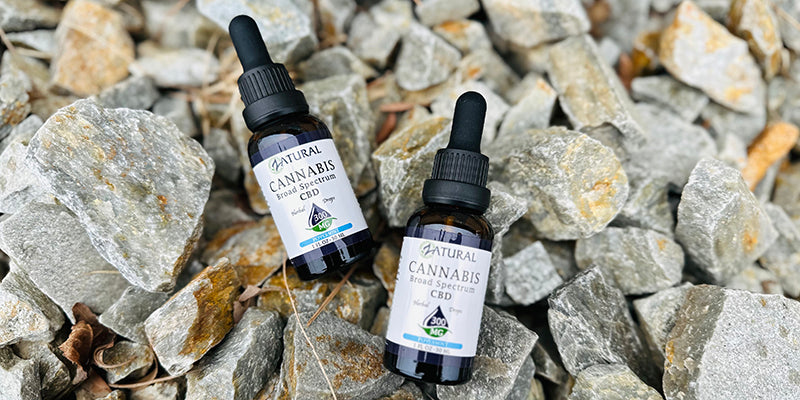Unless you’ve been living under a rock, you’ve probably seen and heard how the health and wellness space continues to buzz with excitement over CBD (particularly CBD oils).
From mood imbalances to physical discomfort, it seems that CBD oils and other CBD-based products have the potential to provide a multitude of benefits to both humans and their beloved pets.
However, we have yet to delve deeper into the CBD tincture variety and its role in possibly assisting with overall health and wellness. What differences, if any, are there between CBD oils and CBD tinctures?
Knowing the answer just might give you enough insights to know which one has the better chance of potentially assisting with your health needs.
In this article, we’ll focus the spotlight on CBD tincture — what it is, how it differs from CBD oil, and how to get the most out of it — so that you can build a deeper understanding of how it can potentially improve your overall health and well-being and figure out if it’s a better option than CBD oil (or not).
Let’s begin.
What Is CBD?
Cannabidiol (CBD), is a natural compound found in hemp, is one of many cannabinoids and lacks the high effects associated with THC. The endocannabinoid system (ECS) is a complex biological system in the body that monitors sleep, appetite, and discomfort sensations.
CBD links to endocannabinoids, which connect to our nervous system. Compounds like CBD interact with ECS receptors like CB1 and CB2, to promote internal balance and overall wellness. However, scientific evidence supporting CBD's benefits is inconclusive, leading the FDA to caution against unproven health claims.
It's important to be careful when adding CBD to your health routine. Ask healthcare professionals for advice before trying any new CBD treatments.
CBD Oil vs. CBD Tincture: Is There a Difference?

People often interchange the terms "CBD oil" and "CBD tincture." However, there are some key differences between the two that are worth delving into. By knowing these differences, people can choose the right product for their needs with more knowledge.
As such, we will explore these differences in more detail below and discuss how they can impact the bioavailability and efficacy of CBD oils and CBD tinctures.
What Is CBD Oil?
CBD oil, derived from high-CBD-low-THC strains of industrial hemp, offers a concentrated form of cannabidiol without significant THC content, making it widely available in markets where THC is restricted.
Typically composed of pure CO2-extracted CBD essence and a carrier oil like MCT, coconut, olive, or hemp seed oil, CBD oil is versatile, allowing for oral consumption, addition to food or drinks, or topical application.
Various products such as capsules, gummies, and creams can be derived from CBD oil, with some individuals opting to create homemade formulations like salves and lotions.
However, the quality and composition of CBD oil can vary significantly depending on the manufacturer and the source of their hemp, highlighting the importance of selecting reputable products.
What Is CBD Tincture?
Tinctures have been used for centuries as a way to extract the medicinal properties of plants. In the case of most CBD tinctures, industrial hemp plant material is steeped in alcohol or another solvent for several weeks to extract the active compounds.

What follows is a filtering process in which most of the alcohol or solvent is evaporated off, leaving a potent liquid that contains CBD and other cannabinoids, as well as terpenes and other beneficial plant compounds.
This process helps protect the cannabinoids from oxidation, but it also results in a bitter, astringent taste. This is why tinctures are often infused with additional ingredients (like sweeteners) to make them more palatable.
Some manufacturers also include other herbal extracts and/or vitamins in their CBD tinctures to achieve certain benefits.
What’s The Difference Between CBD Oil and CBD Tincture?
Confusion arises from terms like "CBD oil" and "CBD tincture," which lack normal FDA regulations. Despite this, distinguishing between CBD oils and tinctures is crucial based on their composition, intended use, and potency.
CBD oil is typically a blend of CBD extract and carrier oils like coconut or hemp seed oil, offering calming effects and versatile topical application for various health concerns.
Conversely, CBD tinctures are made by steeping CBD-rich hemp in high-proof grain alcohol. This is often in addition to other ingredients. The oil is primarily administered orally or sublingually, potentially providing concentrated effects with smaller doses compared to oils.
Understanding these differences aids in selecting the most suitable CBD product for individual needs and preferences.
How To Tell The Difference Between Oil and Tinctures
Separating the difference between CBD oil and CBD tinctures can be confusing, given that they are both used in marketing. However, discerning between them is possible by reviewing the ingredients.
Two key ingredients make up CBD oil. Co2 extracted CBD oil and a carrier oil like coconut oil, olive oil, or hemp seed oil. CBD tinctures are crafted with alcohol or solvent extraction and then additional ingredients like flavoring and fillers. Check for the number of ingredients and mode of extraction to tell the two types apart.
How To Take CBD Oil and CBD Tinctures
For accurate guidance on CBD hemp oil directions, consult the product's label or the product's online description. Some ways of taking CBD are more effective than others. One way to use CBD oil is to place a few drops under your tongue and hold it there for 30 to 60 seconds before swallowing. This method is called sublingual absorption, and it allows the CBD to enter your bloodstream quickly and efficiently.

Another way to use CBD oil is to add it to any food or drink. You can mix it into your morning coffee or smoothie or add it to your favorite recipe. However, keep in mind that adding CBD oil (or any CBD-based product, for that matter) to anything hot may decrease its effectiveness. So, it’s best to add it to cold or room-temperature foods and beverages.
To increase the bioavailability of CBD oil, you can also try combining it with healthy fats like hemp seed oil. This can help your body absorb more CBD and increase its effectiveness.
It’s also important to follow the dosing instructions on the label of your CBD oil. Start with a low dose and gradually increase it until you achieve the desired effects.
If you have any concerns or questions about how to use CBD oil or if you’re currently taking other medications, the best and safest route is to consult with a healthcare professional.
The CBD Entourage Effect
The entourage effect is a crucial yet often overlooked phenomenon in the realm of CBD, referring to the synergistic interaction of various cannabis compounds, including cannabinoids like CBD and THC, along with terpenes.
Terpenes, found in hemp and other plants, contribute aromatic properties and play a significant role in the effects of CBD products. Research suggests that when cannabinoids and terpenes combine, they enhance each other's effects, potentially magnifying the health benefits of CBD.

Studies indicate that high-quality, broad-spectrum CBD, containing cannabinoids and terpenes but no THC, may offer greater health support due to the entourage effect, which requires the presence of all cannabis compounds.
While promising, conclusive evidence regarding CBD's efficacy for specific health concerns remains elusive. Nevertheless, ongoing research holds promise for the future of CBD in the realm of health and wellness, shedding light on its potential benefits as investigations continue to unfold.
Hemp Seed Oil vs. CBD Oil: What’s the Difference?
Now that you have a firmer grasp of CBD oil and CBD tinctures, you’re probably still wondering about another hemp-derived compound that is also marketed similarly: Hemp seed oil. What is hemp seed oil? And how is it linked to CBD oil?
Hemp seed oil and CBD oil are both derived from the hemp plant, but they differ in their composition and benefits. For one, hemp seed oil is extracted from the seeds of the hemp plant, while CBD oil is extracted from the flowers, leaves, and stalks of the plant.
Hemp seed oil is rich in omega-3 and omega-6 fatty acids, antioxidants, and vitamins, making it a popular ingredient in skin care products and food supplements. It does not, however, contain CBD or other cannabinoids and does not have the same health benefits as CBD oil.
CBD oil, on the other hand, contains high levels of cannabidiol CBD and other cannabinoids that may possibly interact with the body’s endocannabinoid system, providing various health benefits that some users simply can’t get enough of.
While hemp seed oil and CBD oil are often used to mean the same thing, they are not the same. And it’s important to understand their differences to avoid confusion and ensure that you’re getting the product that best meets your needs.
Takeaways: Is CBD Tincture Better Than CBD Oil?
The short answer: It depends.
CBD oils and tinctures, while sharing similar benefits, differ in their extraction processes, which can influence their effects. Tinctures are extracted using alcohol-based solvents like ethanol alcohol, while oils undergo CO2 extraction, yielding a purer product.
Tinctures offer benefits comparable to oils but may not suit those sensitive to alcohol or solvents. Conversely, oils, with fewer ingredients, provide a safer daily option for oral, sublingual, and topical use, catering to various needs.
For those seeking cost-effective and effective CBD solutions, CBD oil is recommended by experts like Zatural. Product quality, including third-party testing, should be a priority as it ensures reliability. Nonetheless, consulting healthcare professionals before integrating CBD into your routine, particularly if you are on medications or with medical conditions, is crucial.
Trusting reputable sources and seeking professional guidance are essential for informed decisions regarding CBD's using it in your daily wellness practices.
Zatural CBD Oils
For educational purposes only.
*FDA DISCLAIMER -These statements have not been evaluated by the FDA.



